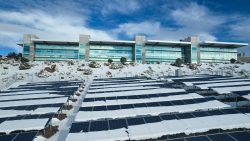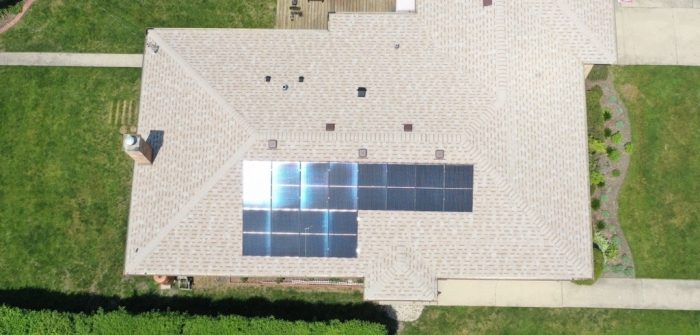
As winter blankets our homes in snow, you might wonder if solar panels are still producing electricity. But did you know that rooftop solar is just as effective in the winter as it is in the summer?

Let it Snow!
It is true, while Energy.gov acknowledges that thick layers of snow can temporarily hinder energy production, solar panels continue to operate effectively during winter! Marla Westerhold, manager of Green Power Connection at ComEd, underscores this by stating, “Solar panels convert light from the sun into electricity, regardless of how cold or hot the weather is. If snow is covering the panels, it will temporarily reduce the output, however there are inherent qualities in the panels that mean snow won’t stay on the panels too long in most cases.”
Rooftop systems are relatively low maintenance, and customers generally do not need to take extra steps to maintain efficiency and peak performance, even during the cold and snow. Most panels are positioned at an angle which makes it easier for snow to slide off the roof when it accumulates, so that your panels can continue to draw power from the sun.
Meet the Mansuri’s
It was the Mansuri’s love of the outdoors that inspired the family to invest in solar panels for their home in Skokie, IL. The decision followed other environmentally friendly decisions like reusing rainwater to hydrate their garden during the summer.
Reflecting on the winter challenges, Ibrahim Mansuri said, “Maintaining solar panels during winter requires little to no maintenance. Based on how the panels were installed in an angle, this position allows the snow to slide off easily, ensuring my panels capture maximum sunlight.”
Another classic and fun fact is that the dark silicone cells in solar panels act as natural snow melters because they absorb heat. Harnessing the sun’s rays, these cells warm up to accelerate the process of snow melting. Typically, the temperature of a solar panel is 36 degrees Fahrenheit warmer than the surrounding temperatures. The result is cleaner panels, free from the compromising effects of dust accumulation in drier regions.

Mansuri’s Solar Panels
“I am a retired engineer, and I know that the dark silicone cells in solar panels play a crucial role. They absorb heat, aiding in snow melting. Plus, the albedo effect, where snow reflects sunlight, contributes to increased energy absorption,” added Ibrahim.
There are a few key reasons solar technology stands up well to the winter elements –
First, the albedo effect means that panels surrounded by snow can absorb up to twice the usual amount of light, significantly increasing energy output.
Second, the snow’s anti-soiling properties prove to be an unexpected advantage, providing a cost-free cleaning service for solar panels. As snow melts off the array, it naturally cleans the panel surfaces, ensuring optimal efficiency. In regions where dust tends to build up, this is a welcome bonus.
While this is Ibrahim’s first few months with their solar panels, he mentioned how the panels are already paying off. The Mansuri’s paid about $100 less on their bill in July 2023 than they did in July 2022. “I think this is great,” said Ibrahim. “I am happy to have made this decision.”
Considering solar for your own home or business? Learn if it’s the right fit by visiting the Comed.com/Solar. You can also view the company’s solar calculator, Comed.com/SolarCalc. The new-and-improved online tool prompts users with questions about their current energy usage and future power needs for items like an electric vehicle. Then it shares a base-level estimate of costs, energy-generation potential and return on investment for those who are ready to make the renewable energy transition.
